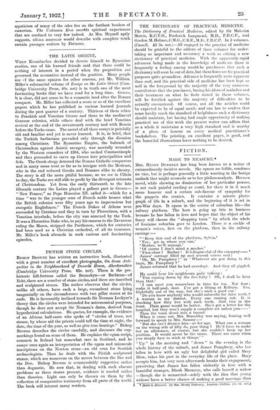THE LATIN ORIENT.
WREN Krumbacher decided to devote himself to Byzantine studies, one of his learned friends said that there could be nothing of interest in a period when the preposition am-O governed the accusative instead of the genitive. Many people are cf the same opinion for other reasons, yet Mr. William Killer's substantial volume of Essays on the Latin Orient (Cam- bridge University Press, 40s. net) is in truth one of the most fascinating books that we have read for a long time. Greece, it is clear, did not cease to be a romantic land after the Roman conquest. Mr. Miller has collected a score or so of the excellent papers which he has published in various learned journals during the past quarter of a century. Thirteen of them relate to Frankish and Venetian Greece and three to the mediaeval Genoese colonies, while others deal with the brief Venetian revival at the end -of the seventeenth century and with Bosnia before the Turks came. The moral of all these essays is painfully old and familiar and yet is never learned. It is, in brief, that the Turkish barbarians prevailed only through the disunion among Christians. The Byzantine. Empire, the bulwark of Christendom against Asiatic savagery, was mortally wounded by the Western crusaders of 1204, who sacked Constantinople and then proceeded to carve up Greece into principalities and fiefs. The Greek clergy detested the Roman Catholic conquerors and in many cases went so far as to intrigue with the Moslems, who in the end reduced Greeks and Romans alike to slavery. The story ia all the more pitiful because, as we see in Cilicia to-day, the Turks are still able to profit by the divergent interests of Christendom. Yet from the early thirteenth to the late fifteenth century the Latins played a gallant part in Greece- " New France," as Pope Honorius III. called it—which for a time " was to the younger sons of French noble houses what the British colonies were fifty years ago to impecunious but energetic Englishmen." The French Dukes of Athens were succeeded. by Catalans and they in turn by Florentines, with a Venetian interlude, before the city was annexed by the Turk. It was a Florentine Duke who, to pay his ransom to the Navarrese ruling the Mores, stripped the Parthenon, which for centuries had been used as a Christian cathedral, of all its treasures. Mr. Killer's book abounds in such curious and fascinating episodes..










































 Previous page
Previous page